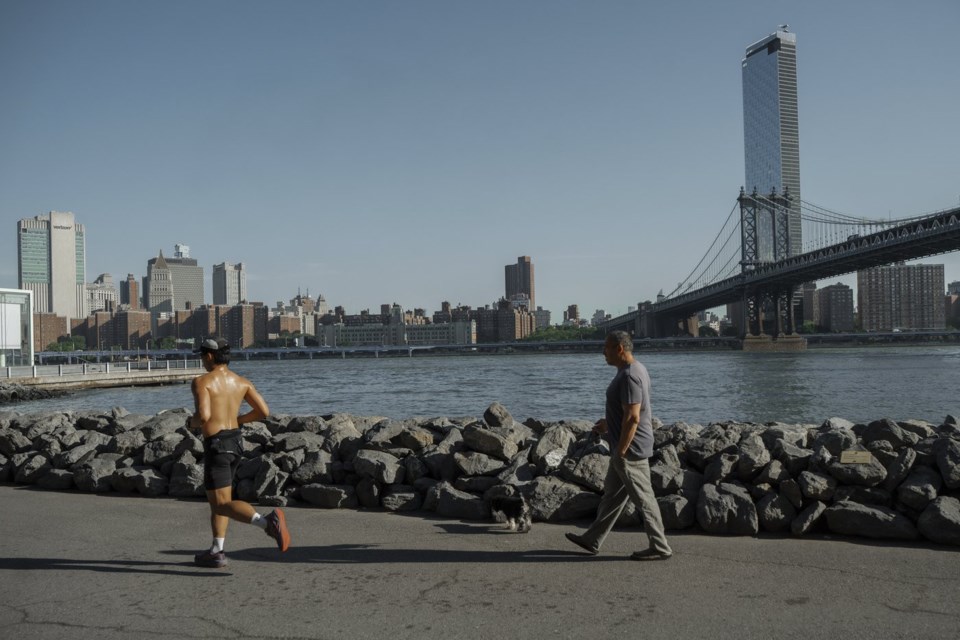Extreme heat makes it especially hard for your body to cool down, so you need to be extra careful if you exercise or play sports when it's baking outside.
Your brain tries to keep your body within a degree or two of 98.6 degrees Fahrenheit (37 degrees Celsius), and it does so in part by triggering sweat. When sweat dries, it carries away heat from your body's surface.
When sweat can't do its job — because your body is generating a lot of heat or it's too hot and humid to cool down — you are at risk of becoming dehydrated or even getting a heat-related illness such as heat exhaustion or heat stroke.
Bharat Venkat, an associate professor at UCLA and the director of the UCLA Heat Lab, says heat can impact the entire body. “We’ll often talk about heat cramps. We’ll talk about heat exhaustion. We will talk about heat stroke,” he said. “But it’s actually much wider than that. Heat can really impact every system in our body, our hearts, our lungs.”
When heat is dangerous — and why humidity matters
The higher the temperature, the harder it is for the body to stay cool, but humidity plays a big role too. High humidity makes it feel hotter than the temperature because it makes sweating less effective. There's so much water in the air already that it can't take up much more — including the water in your sweat.
The heat index, which factors in humidity and is included on many weather forecasts, provides a sense of how hot it really feels — and what's dangerous for prolonged exposure or strenuous activity.
The National Oceanic and Atmospheric Administration says people should start exercising “caution” when the heat index reaches 80 to 90 degrees and “extreme caution” from 90 to 103 degrees. It labels everything over 103 “danger” or “extreme danger."
NOAA has a chart that shows how the heat index is affected by humidity. For example, a day that is 90 degrees Fahrenheit (32 Celsius) can hit the “danger” level with 70% humidity.
Tips for staying safe if you exercise in the heat
If you want to exercise in the heat, here are some tips to say safe, according to the U.S. Centers for Disease Control and Prevention.
— Time your exercise and outdoor activities for the coolest parts of the day.
— Try to exercise in the shade as much as possible.
— Take frequent breaks.
— Drink lots of fluids, and limit drinks that are high in sugar, caffeine and alcohol. Don't wait until your are thirsty to drink more.
— Exercise with someone so you can check on each other, or pair up with a teammate.
How to recognize that you may be overheating
If you start to feel any of these symptoms, stop exercising, get to a cool place and seek medical care:
— Muscle cramping or muscle weakness
— Shortness of breath
— Dizziness
— Headaches
— Nausea
If you take it too far, you can risk serious heat related illnesses
“Athletes and other folks who regularly engage in strenuous activity often think that they can handle it,” UCLA’s Venkat said. “But a lot of studies have shown that we’re really bad at gauging how hot it is.”
A common heat-related illness is heat exhaustion, which can be marked by rapid heartbeat, fast breathing, headache, nausea and muscle weakness or cramping.
It can develop into the more serious heat stroke, when your body can no longer control its temperature. Symptoms include confusion or slurred speech, seizures or even loss of consciousness.
Heat also increases your risk for a rare condition called rhabdomyolysis, which causes the rapid breakdown of muscles. If you think you or a fellow athlete are in danger, call 911, give them fluids — preferably water — and try to cool their bodies with cold water or cold compresses.
And even if you think you can deal with the heat, Venkat said, “It’s better to kind of take a step back and take it easy.”
___
AP video journalist Laura Bargfeld contributed to this report.
___
The Associated Press Health and Science Department receives support from the Howard Hughes Medical Institute’s Department of Science Education and the Robert Wood Johnson Foundation. The AP is solely responsible for all content.
The Associated Press



